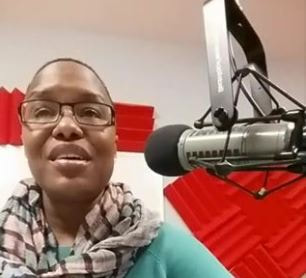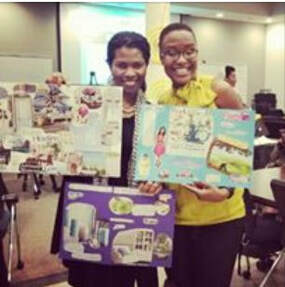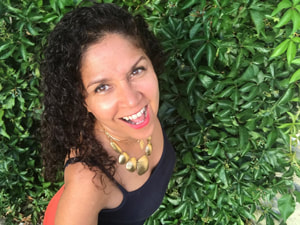Guest Blog Post: Dr. Bahby BanksA Student Uses Her Voice as a Motivational Speaker and Consultant3/19/2019 Guest Blog Post: Dr. Bahby Banks was one of my first students in the International Training Program. After completing her doctoral degree, she has become a successful business owner, motivational speaker, and consultant. She helps other women of color envision their futures and helps businesses evaluate their programs. She is always a welcome guest speaker for our group of new students. Here is Bahby's story in her own words. I participated in the inaugural Mount Sinai School of Medicine (MSSM) Exchange Program for Minority Students in 2006, shortly after I completed the first year of my doctoral studies at UNC Gillings School of Public Health. My research internship included placements at Fundacão Oswaldo Fiocruz in Rio de Janiero, Brazil and Hospital Alvarez in Buenos Aires, Argentina. Dr. Claudio did an amazing job of preparing us for our internships, including a week-long orientation in New York City. During this week, we were introduced to local researchers and scientists, provided with instructional language CDs and given literature that detailed the importance of inclusion of underrepresented populations in research. Every single detail of orientation week wreaked “love” and “investment” from Dr. Claudio and her staff.
After orientation, I made my way to my first placement at Fundacão Oswaldo Fiocruz, where I worked with Drs. Lucia Rotenburg and Rosane Greip to explore gender differences in work ability among Brazilian nurses. My lab consisted of about five young researchers—all women- who investigated various aspects of Dr. Rotenburg’s research. My work with the Fiocruz team continued after I returned to United States, and resulted in a peer-reviewed publication (Rotenberg L, Portela LF, Banks B, Griep RH, Fischer FM, Landsbergis P. A gender approach to work ability and its relationship to professional and domestic work hours among nursing personnel. Appl Ergon. 2008;39(5):646-52)! The following year, I traveled with Dr. Rotenburg to the 18th International Symposium on Shiftwork and Working Time in Australia—where I was the only delegate from the United States. Quite an honor! My second placement in 2006 was in Buenos Aires with Dr. Diana Gilamberti, director of Obstetrics and Gynecology (OB/GYN) at Hospital Alvarez. I worked with another Mount Sianai intern to develop a survey to explore the use of petroleum-based lubricants among sex workers receiving services in the OB/GYN department. This was probably one of the most intriguing experiences that I’d as a budding researcher, as Dr. Gilamberti invited us to share the survey findings with two sex worker union representatives in Buenos Aires. The representatives responded with such passion and were adamant about prioritizing the safety and health of “their girls”. The response to raise awareness about the dangers of petroleum-based lubricant use was the quickest I hade seen for any public health effort. By the end of my internship, the local health department began supplying the hospital with condoms packaged with lubricants. They also made them available at the local health department. My journey to become founder and CEO of Pillar Consulting, Inc. was a very non-traditional one. I knew very early on during my doctoral training that I wanted to serve as a faculty member and independent research consultant. I did not, however, have a “roadmap” to guide how I could navigate both of these roles successfully. I had a powerful network of mentors to guide my steps in academia, offering opportunities to contribute to research in historically oppressed communities. Opportunities did not always present themselves in “traditional” ways, but I was very proactive in seeking leadership and research roles that supplemented my academic training. Many of my mentors, including Dr. Claudio, were not in my department, but they were invested in my growth as a researcher. The most powerful shift as a research intern was learning my role as a contributor to research. The Impostor syndrome is very real, particularly for people navigating industries that have historically excluded women and racial and ethnic minorities. I did not always feel that I belonged—despite doing all of the work to earn my seat in the room. But, sitting alongside senior women researchers who successfully navigated the academy was priceless. It was a mirror of sorts for where I wanted to be after I completed my studies. Two things I learned over the course of my training: 1) Your work will always speak for you and 2) Think outside of the box. My applying for the Mount Sinai International Exchange Program for Minority Students was an example of the latter, as this type of training program was not available at my home institution. I participated in several internships over the course of my studies, and while the variation in topic areas appeared as a “lack of focus” to some faculty, I knew exactly how these opportunities could build my professional portfolio. I knew that I wanted to add international training to my professional portfolio, and these internships afforded the opportunity to supplement the training I was learning in the classroom. As a result of seizing these opportunities, I was able to conduct research at the World Health Organization, Fundacão Oswaldo Cruz, Hospital Alvarez, and ultimately worked with an amazing research team in rural North Carolina. My love for program evaluation and mixed-method approaches led to my current career as a business owner and independent research consultant. During my doctoral studies, I enrolled in courses and took advantage of external training opportunities to develop my research skills (e.g., qualitative methodology, racial and equity training, community-based research). Business development took a little more work, as I didn’t know any researchers navigating the path of entrepreneurs! I did, however, reach out to several men and women in my network who were entrepreneurs to glean what wisdom I could to position Pillar Consulting as a competitive company. Networking was key! I share with my mentees the importance of having a “tangible” when they complete a research internship—something that documents their contribution to the research. This “tangible” might vary from place to place: a conference poster, oral presentation, brief, video or peer-reviewed publication. No matter the case, the goal is to share your findings. Dissemination is key in ensuring your work, and the work of the communities you serve. As an academician, peer-reviewed publications are essential to building your tenure package. Scientific writing in essential to sharing your work with the Academy. Now, as a business owner, I focus most of my work with Pillar Consulting on historically oppressed populations whose voices have not been part of “best practices” shared in the literature. That said, we work with clients to help build their capacity to lead and contribute to the dissemination of their work. We, as research scientists, continue to partner across the county to disseminate the work of our partners. Participating in Dr. Claudio’s internship helped me achieve my career goals. There is power in being able to say that part of your academic training included contributions in national and international settings. By the time I completed my Ph.D., I had co-authored several peer-reviewed publications in national and international journals, presented at conferences around the world and had a vast network of colleagues around the globe. These opportunities laid the foundation for me to become the researcher I am today! I would not be where I am today without mentors who were invested in my success and growth as a public health researcher. As a military dependent, I was accustomed to being in a variety of academic settings—public, private, predominantly White, or predominantly Black—but I was the first (but not last) member of my family to pursue doctoral training. In more ways than one, there was no a roadmap for me to follow. My mentors, near and far, were open and transparent about their journeys in research, and pushed me to raise the bar for myself. They believed in me when I didn’t believe in myself and challenged me to (literally) use my voice at the decision-making table. They helped me see my dual role as a trainee and contributor to research. I continue to grow as a leader and evaluation researcher every day. My goal of building community capacity in research has not changed, but my approach has. My team is committed to working with an equity-based lens. We are working with partners whose approaches include social determinants of health and structural-based approaches to improving the human condition. What I say to new students in these internship programs is this: Use your voice. In the words of the late Shirley Chisholm, “If they don't give you a seat at the table, bring a folding chair.”
0 Comments
Your comment will be posted after it is approved.
Leave a Reply. |
This section will not be visible in live published website. Below are your current settings: Current Number Of Columns are = 1 Expand Posts Area = 1 Gap/Space Between Posts = 8px Blog Post Style = card Use of custom card colors instead of default colors = 1 Blog Post Card Background Color = current color Blog Post Card Shadow Color = current color Blog Post Card Border Color = current color Publish the website and visit your blog page to see the results AuthorDr. Luz Claudio is an environmental health scientist, mother and consultant, originally from Puerto Rico. She is a tenured professor of environmental medicine and public health. Luz recently published her first book: How to Write and Publish a Scientific Paper: The Step-by-Step Guide. Dr. Claudio has internship programs and resources for young scientists. Opinions expressed in this blog are solely her own and may not reflect her employer's views. Categories
All
|
|
Dr. Luz Claudio
[email protected] |
|
Opinions expressed in this website are solely Dr. Luz Claudio's own and may not reflect her employer's views. None of the information on this website should be taken as medical advice.
© COPYRIGHT 2018. ALL RIGHTS RESERVED.




 RSS Feed
RSS Feed